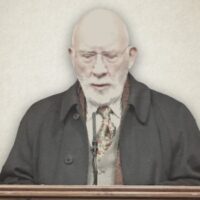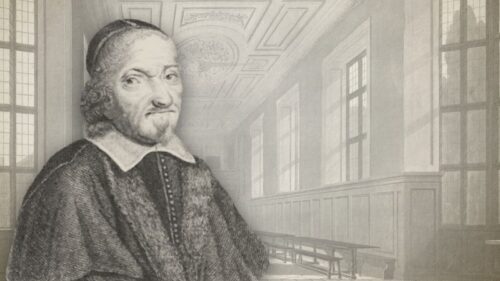
Reflections On Some Recent Banner Of Truth Criticisms Regarding William Huntington And Avarice
The Banner critics portray Huntington as living like an Eastern Nabob in the lap of luxury. Providence Chapel paid their pastor a salary of £100 per annum at the beginning of his ministry but this was rapidly doubled. This was not an unusual amount. Rowland Hill, the only London pastor who could compete in numbers received half to a third more salary than Huntington. James Hervey (1714-1758) received £180 per year and also the profits from a farm which had been in the family for generations. In spite of his popularity, Hervey’s congregations was only half that of Huntington’s. Pastors in patronised livings, however, often received between £600 and £1,000 a year. Many Evangelical clergymen such as Moses Browne, Vicar of Olney when John Newton was his Curate, pastored a number of churches on a sinecure basis which brought them in huge sums. Others such as Dr John Cowper, William Cowper’s father, combined his pastorate with a lucrative sinecure governmental position. Be that as it may, when the news of Huntington’s salary travelled through the London churches, pastored by ex-public school boys and university graduates who were often paid far less, criticism grew. How could an untrained labourer earn as much as a university graduate? Thomas Scott, who always had difficulty making two ends meet, was scathing in his criticism.. When he heard that Huntington was in financial difficulties, too, he gloated to his friends that if he had as much money as Huntington, he would know how to manage it better. This was the kind of unfair criticism that Huntington was reaping from all quarters. Most of the evangelical ministers in London, including Scott, however, were heavily patronised by such benefactors as the Countess of Huntingdon, Lord Dartmouth, John Thornton or Lord Carrington. Thus their basic salary rarely reflected their true income. When John Newton, for instance was receiving a basic salary of a mere £60 per year, he was provided with over four times that amount annually by his patrons so that he could do charitable work in Olney. Huntington had no patron whatsoever. Most of Huntington’s self-chosen enemies were ministers of churches which were either on free-hold property or belonged to those people who owned the living or were supported by some trust or organisation. Huntington’s chapel was on rented land, the rent alone being half of his salary per annum. Huntington made all the debts of his church his own debts and if money for repairs etc. was not forthcoming from church funds, he provided the money from his own pocket. Thus at times Huntington needed an income of thousands per annum, not a mere £100. That income was usually raised when needed although Huntington insisted that any gifts to the church or to himself coming from ‘outsiders` would be sent back with thanks.
Huntington’s method of financing his church and its works of charity was remarkable for its being no method at all. Other free-churches at this time had contracts with their members whereby they paid so much money a week or per month. Huntington’s custom was to wait until money was needed then announce the exact sum from the pulpit and wait in faith until it came. “Half a dozen words, he told one correspondent, “brings in £60 or £70.” He went on to say that he never spent 20 minutes in the pulpit, “pumping and squeezing a few shillings out of the pockets of worldlings”. Huntington was firmly against reaping where he had never sown and did not allow his people to collect from door to door as was the custom. In spite of all Huntington`s restrictions, very soon Providence Chapel was able to distribute three or four hundred guineas a year to causes which they felt were worthy, provide £700 for repairs and extensions to the chapel and £2,000 to support the building funds of other churches. Once when Huntington heard that there was acute poverty in Russia, he collected £200 for the Russian poor in a single short appeal. Whenever a member grew too old to work or was in honest financial straits, Huntington would remind his congregation of their responsibility towards one another and the person in question would go home with a plateful of guineas and half-guineas. Often, when Huntington had financial problems himself, they were due to his own generosity in not being able to keep a penny in his pocket whenever he felt someone was in need. He had felt poverty too much himself to be deaf to the pleas of others. As everyone knew that Huntington was always approachable when money was needed, many a person took advantage of this and fooled Huntington into lending him money which he never intended to pay back or ask for money when there was no real need for it. This weakness was very apparent during Huntington`s early days as pastor of Providence Chapel. Two businessmen, for instance, worth thousands themselves, fooled Huntington into giving them £100 leaving himself penniless. Huntington said of himself at this time, “unremitted importunity dragged me like an ox to the slaughter, or as a fool to the correction of the stocks”.
But the rumours increase. Iain Murray speaks of Huntington driving around in the equivalent of a Bentley, which is his exaggeration for a second hand coach and pair, seemingly not realising that this was the normal mode of transport at the time. But Murray’s argument is that Huntington had no right to this privilege as a low-born man. He does not criticise John Newton for driving around in a coach with a duke’s insignia on the doors, nor John Rippon who had a Cinderella coach all of glass. But William Huntington is not allowed to pick up his farm labourers in the morning and take them the five miles to church because poor people, we understand, ought to walk! I wonder if Mr Murray wrote these words as he commuted backwards and forwards from Australia to Britain, to America in a luxury jet?
George Ella
——————————————
George M. Ella is a historian, author and biographer. His writings may be accessed at the online archived, ”Biographia Evangelica”.
George M. Ella, born February 1939 in Yorkshire, England, has lived most of his life on the European Continent. He is a retired Senior Civil Servant formerly employed in teaching, post-graduate teacher-training, chairing examination boards and curricula work. He holds degrees from London, Hull, Uppsala, Essen, Duisburg and Marburg universities with doctorates in English Literature and Theology. Dr. Ella has written regularly since the seventies for a number of magazines and newspapers and published numerous books on Church History, including biographies of William Cowper, William Huntington, James Hervey, John Gill, Augustus Montague Toplady, Isaac McCoy and Henry Bullinger besides works on doctrine and education. He is currently finishing the third volume of his series 'Mountain Movers'; a biography of John Durie; a work on Law and Gospel and further study material for the Martin Bucer Seminar. Dr. Ella is still internationally active as a lecturer and is a Vice-President of the Protestant Reformation Society. He is keenly interested in missionary work and has written on the spread of the Gospel amongst the Same people of Lapland, the people of India and the Native Americans. This present volume follows Dr. Ella's 'The Covenant of Grace and Christian Baptism', also published by the Martin Bucer Seminar. George Ella is married to Erika Ella, nee Fleischman, a former government administrator, and they have two sons Mark (41), Director of a Polytechnic College in Bremerhaven and Robin (39), Leading Senior Physician in a newly-built Geriatric and Psychiatric clinic in Dessau.
George Ella on Doctrinal Matters
George Ella's Biographical Sketches





